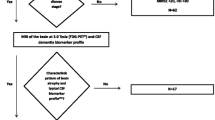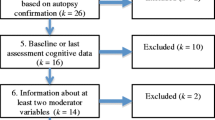Abstract
The aim of this study was to investigate whether a brief neuropsychological battery consisting of a limited number of cognitive tests and an evaluation of the behavioural domains intended to discriminate between frontotemporal dementia (fv–FTD) and Alzheimer's disease (AD), constitutes a useful instrument for making a differential clinical diagnosis between these two pathologies. Nineteen fv–FTD and 39 AD patients were compared on cognitive tasks (assessing memory, executive functions, language and constructional praxis) and on the NPI behavioural assessment. A stepwise discriminant analysis was performed to identify the linear combination of cognitive and behavioural measures able to best discriminate between the two groups. One test for each of the investigated cognitive domains (Delayed Prose Recall, FAS verbal fluency, Boston naming test, Rey's Figure A Copy) and the four subscales of the Neuropsychiatry Inventory (NPI) which best differentiated between fv–FTD and AD patients (apathy, disinhibition, euphoria, aberrant motor behaviour) were used. The analysis selected Rey's Figure A Copy, FAS verbal fluency and NPI apathy subscale as the best discriminants between fv–FTD and AD patients. The final equation assigned 73.7% of the fv–FTD patients and 94.7% of the AD patients to the correct diagnostic group. A validation study conducted on a new independent sample of 11 fv–FTD and 22 AD patients confirmed the high sensitivity (82.6 %) and specificity (81.8%) of the diagnostic equation in assigning fv–FTD and AD patients to the correct dementia group. Although both cognitive and behavioural differences exist between FTD and AD, previous studies have aimed at differentiating the two pathologies by considering the two aspects separately and discriminant analyses were focused only on neuropsychological or neuropsychiatric evaluations. The present results emphasise the importance of rating both cognitive and behavioural clinical features of the two syndromes as objectively as possible to improve differential diagnostic accuracy.
Similar content being viewed by others
References
Binetti G, Locascio JJ, Corkin S, Vonsattel JP, Growdon JH (2000) Differences between Pick Disease and Alzheimer disease in clinical appearance and rate of cognitive decline. Arch Neurol 57:225–232
Borkowsky JG, Benton AL, Spreen O (1967) Word fluency and brain damage. Neuropsychologia 5:135–140
Bozeat S, Gregory CA, Lambon Ralph A, Hodges JR (2000) Which neuropsychiatric and behavioural features distinguish frontal and temporal variants of frontotemporal dementia from Alzheimer's disease. J Neurol Neurosurg Psychiatry 69:178–186
Braak H, Braak E (1991) Neuropathological staging of Alzheimer–related changes. Acta Neuropathol (Berl) 82:239–259
Brun A (1993) Frontal lobe degeneration of non–Alzheimer type revisited. Dement Geriatr Cogn Disord 4:126–131
Carlesimo GA, Buccione I, Fadda L, Graceffa A, Mauri M, Lorusso S, Bevilacqua G, Caltagirone C (2002) Standardizzazione di due test di memoria per uso clinico: Breve Racconto e Figura di Rey. Nuova Rivista di Neurologia 12:1–13
Carlesimo GA, Caltagirone C, Gainotti G (1996) The Mental Deterioration Battery: normative data, diagnostic reliability and qualitative analyses of cognitive impairment. The Group for the Standardization of the Mental Deterioration Battery. Eur Neurol 36(6):378–384
Charpentier P, Lavenu I, Defebvre L, Duhamel A, Lecouffe P, Pasquier F, Steinling M (2000) Alzheimer's disease and frontotemporal dementia are differentiated by discriminant analysis applied to Tc HmPAO SPECT data. J Neurol Neurosurg Psychiatry 69:661–663
Cummings JL, Mega M, Gray K, Rosemberg–Thompson S, Carusi DA, Gornbein J (1994) The Neuropsychiatry Inventory: comprehensive assessment of psychopathology in dementia. Neurology 44:2308–2314
Dubois B, Slachevsky A, Litvan I, Pillon B (2000) The FAB: a Frontal Assessment Battery at bedside. Neurology 12:1621–1626
Folstein MF, Folstein SE, McHigh PR (1975) "Mini Mental State": a practical method for grading the cognitive state of patients for the clinician. J Psychiatr Res 12:189–198
Galton CJ, Patterson K, Xuereb JH, Hodges JR (2000) Atypical and typical presentation of Alzheimer's disease: a clinical, neuropsychological, neuroimaging and pathological study of 13 cases. Brain 123:484–498
Goodglass H, Kaplan E (1972) The Boston Diagnostic Aphasia Examination. The assessment of aphasia and related disorders. Lea and Febiger, Philadelphia
14. Goodglass H, Kaplan E (1973) The Boston Diagnostic Aphasia Examination. The assessment of aphasia and related disorders (second ed. ). Lea and Febiger, Philadelphia
Gregory CA, Hodges JR (1996) Frontotemporal dementia: use of consensus criteria and prevalence of psychiatric features. Neuropsychiat Neuropsychol Behav Neurol 9:937–942
Gregory CA, Orrel M, Sahakian B, Hodges JR (1997) Can frontotemporal dementia and Alzheimer's disease be differentiated using a brief battery of tests? Int J Geriatr Psychiatry 12: 375–383
Hair JF, Anderson RE, Tatham RL, Black WC (1998) Multiple discriminant analysis and logistic regression, Chapter in:Multivariate data analysis, Prentice Hall, p 258
Hodges JR, Garrard P, Perry R, Patterson K, Ward R, Bak Thomas, Gregory C (1999) The differentiation of semantic dementia and frontal lobe dementia (temporal and frontal variants of frontotemporal dementia) from early Alzheimer's disease: A comparative neuropsychological study. Neuropsychology 13(1):31–40
Hodges JR, Miller B (2001) The classification, genetics and neuropathology of frontotemporal dementia. Introduction to the special topic papers: Part I Neurocase 7:31–35
Hughes CP, Berg L, Danziger WL, Coben LA, Martin R (1982) A new clinical scale for the staging of dementia. Br J Psychiatry 140:566–572
Ikeda M, Brown A, Holland AJ, Fukuhara R, Hodges JR (2002) Changes in appetite, food preference and eating habits in frontotemporal dementia and Alzheimer's disease. J Neurol Neurosurg Psychiatry 73:371–376
Jagust WJ, Reed BR, Seab JP, Kramer JH, Budinger TF (1989) Clinical–physiologic correlates of Alzheimer's disease and frontal lobe dementia. Am J Physiol Imaging 4:89–96
Kertesz A, Nadkarni N, Davidson W, Thomas AW (2000) The frontal behavioral inventory in the differential diagnosis of frontotemporal dementia. J Int Neuropsychol Soc 6:460–468
Kumar A, Shapiro MB, Haxby JV, Grady CL, Friedland RP (1990) Cerebral metabolic and cognitive studies in dementia with frontal lobe behavioural features. J Psychiatr Res 24:97–109
Lebert F, Pasquier F, Souliez L, Petit H (1998) Frontotemporal behavioural scale. Alzheimer Dis Assoc Disord 12(4):335–339
Levy ML, Miller BL, Cummings JL, Fairbanks LA, Craig A (1996) Alzheimer's disease and frontotemporal dementias. Behavioral distinction. Arch Neurol 53:687–690
Litvan I, Agid Y, Sastrj N, Jankovic J, Wenning GK, Goetz CG, Verny M, Brandel JP, Jellinger K, Chaudhuri KR, McKee A, Lai EC, Pearce RK, Bartko JJ, Sastrj N (1997) What are the obstacles for an accurate clinical diagnosis of Pick's disease? A clinicopathologic study. Neurology 49:62–69
Liu W, Mille BL, Kramer JH, Rankin K, Wyss–Coray C, Gearhart R, Phengrasamy L, Weiner M, and Rosen HJ (2004) Behavioral disorders in the frontal and temporal variants of frontotemporal dementia. Neurology 67:742–748
Lopez OL, Litvan I, Catt KE, Sowe R, Klunk W, Kaufer DI, Becker JT, DeKosky ST (1999) Accuracy of four clinical diagnostic criteria for the diagnosis of neurodegenerative dementia. Neurology 53:1292–1299
Mathuranath PS, Nestor PJ, Berrios GE, Rakovicz W, Hodges JR (2000) A brief cognitive test battery to differentiate Alzheimer's disease and frontotemporal dementia. Neurology 55:1613–1620
McKhann G, Drachman D, Folstein M, , Katzman R, Price D, Stadlan EM (1984) Clinical diagnosis of Alzheimer's disease: report of the NINCDS–ADRDA work group under the auspices of Department of Health Services Task Force on Alzheimer's disease. Neurology 34:939–944
Mendez MF, Cherrier M, Perryman KM, Pachana N, Miller BL, Cummings JL (1996) Frontotemporal dementia versus Alzheimer's disease: differential cognitive features. Neurology 47:1189–1194
Mendez MF, Perryman KM, Miller BL, Cummings JL (1998) Behavioral differences between frontotemporal dementia and Alzheimer's disease: a comparison on the BEHAVE–AD rating scale. Int Psychogeriatr 10(2):155–162
Mendez MF, Selwood A, Mastri AR, Frey WH (1993) Pick's disease versus Alzheimer's disease: a comparison of clinical characteristics. Neurology 43: 289–292
Miller BL, Gearhart R (1999) Neuroimaging in the diagnosis of frontotemporal dementia. Dement Geriatr Cogn Disord 10(S):71–74
Miller BL, Ikonte C, Ponton M, Levy M, Boone K, Darby A, Berman N, Mena I, Cummings JL (1997) A study of the Lund and Manchester research criteria for frontotemporal dementia: clinical and single–photon emission CT correlations. Neurology 48:937–942
Nagy Z, Hindley NJ, Braak E, Yilmazer– Hanke DM, Shults C, Barnetson L, King EM, Jobst KA, Smith AD (1999) The progression of Alzheimer's disease from limbic regions to the neocortex: clinical, radiological and pathological relationships. Dement Geriatr Cogn Disord 10:115–120
Neary D, Snowden JS, Gustafson L, Passant U, Stuss D, Black S, Freedman N, Kertesz A, Robert PH, Albert M, Boone K, Miller BL, Cummings J, Benson DF (1998) Frontotemporal lobe degeneration. A consensus on clinical diagnostic criteria. Neurology 51:1546–1554
Pachana NA, Boone BK, Miller BL, Cummings JL, Berman N (1996) Comparison of neuropsychological functioning in Alzheimer's disease and frontotemporal dementia. J Int Neuropsychol Soc 2:505–510
Pasquier F, Grymonprez L, Lebert F, Van der Linden M (2001) Memory impairment differs in frontotemporal dementia and Alzheimer's disease. Neurocase 7:161–171
Pasquier F, Lebert F, Grymonprez L, Pettit H (1995) Verbal fluency in dementia of frontal lobe type and dementia of Alzheimer type. J Neurol Neurosurg Psychiatry 58:81–84
Perry RJ and Hodges JR (2000) Differentiating frontal and temporal variant frontotemporal dementia from Alzheimer's disease. Neurology 54:2277–2284
Ratnavalli E, Brayne C, Dawson K, Hodges JR (2002) The prevalence of frontotemporal dementia. Neurology 58:1615–1621
Rey A (1941) L'examen psychologique dans les cas d'encephalopathie traumatique. Archives de Psychologique 28:286–340
Rosen HJ, Gorno–Tempini ML, Goldman WP, Perry RJ, Shuff N, Weiner M, Feiwell R, Kramer JH, Miller BL (2002) Patterns of brain atrophy in frontotemporal dementia and semantic dementia. Neurology 58:198–208
Rosen HJ, Hartikainen KM, Jagust W, Kramer JH, Reed BR, Cummings JL, Boone K, Ellis W, Miller C, Miller BL (2002) Utility of clinical criteria in differentiating frontotemporal lobar degeneration (FTLD) from AD. Neurology 58:1608–1615
Rozzini L, Lussignoli G, Padovani A, Bianchetti A, Trabucchi M (1997) Alzheimer's disease and frontotemporal dementia. Arch Neurol 54:350
Siri S, Benaglio I, Frigerio A, Binetti G, Cappa SF (2001) A brief neuropsychological assessment for the differential diagnosis between frontotemporal dementia and Alzheimer's disease. Eur J Neurol 8:125–132
Slachevsky A, Villalpando JM, Sarazin M, Hahn–Barma V, Pillon B, Dubois B (2004) Frontal assessment battery and differential diagnosis of frontotemporal dementia and Alzheimer's disease. Arch Neurol 61(7):1104–1107
Snowden JS, Bathgate D, Varma A, Blackshaw A, Gibbons ZC, Neary D (2001) Distinct behavioural profiles in frontotemporal dementia and semantic dementia. J Neurol Neurosurg Psychiatry 70:323–332
The Lund and Manchester Groups. Clinical and neuropathological criteria for frontotemporal dementia. J Neurol Neurosurg Psychiatry 57:416–418
Varma AR, Snowden JS, Lloyd JJ, Talbot PR, Mann DMA, Neary D (1999) Evaluation of the NINCDS–ADRDA criteria in the differentiation of Alzheimer's disease and frontotemporal dementia. J Neurol Neurosurg Psychiatry 66:184–188
Author information
Authors and Affiliations
Corresponding author
Rights and permissions
About this article
Cite this article
Perri, R., Koch, G., Carlesimo, G.A. et al. Alzheimer's disease and frontal variant of frontotemporal dementia. J Neurol 252, 1238–1244 (2005). https://doi.org/10.1007/s00415-005-0849-1
Received:
Revised:
Accepted:
Published:
Issue Date:
DOI: https://doi.org/10.1007/s00415-005-0849-1




